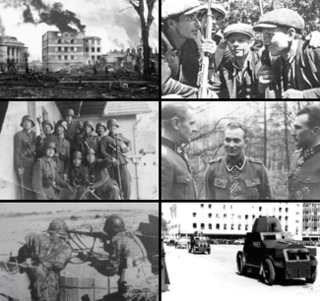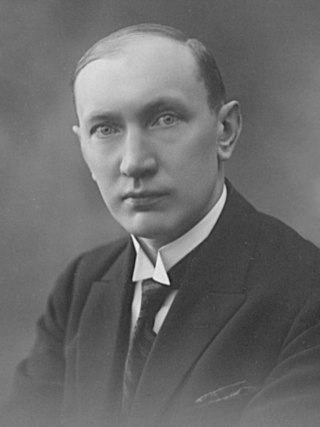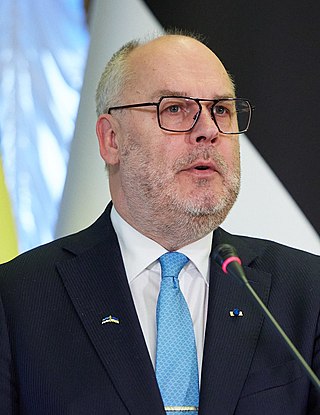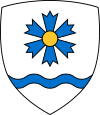
Tartu is the second largest city in Estonia after Tallinn. Tartu has a population of 97,435. It is 186 kilometres southeast of Tallinn and 245 kilometres northeast of Riga, Latvia. Tartu lies on the Emajõgi river, which connects the two largest lakes in Estonia, Lake Võrtsjärv and Lake Peipus. From the 13th century until the end of the 19th century, Tartu was known in most of the world by variants of its historical name Dorpat.

The University of Tartu is a public research university located in the city of Tartu, Estonia. It is the national university of Estonia. It is also the largest and oldest university in the country. The university was founded under the name of Academia Gustaviana in 1632 by Baron Johan Skytte, the Governor-General of Swedish Livonia, Ingria, and Karelia, with the required ratification provided by King Gustavus Adolphus, shortly before the king's death on 6 November in the Battle of Lützen (1632).

Kaarel Eenpalu was an Estonian journalist, politician and head of state, who served as 7th Prime Minister of Estonia.

Tartu Airport is an airport in Reola, Ülenurme Parish, 5.9 nautical miles south southwest of Tartu, the second largest city in Estonia. It is also called Ülenurme Airport due to its proximity to the village of Ülenurme. The Tallinn–Tartu–Võru–Luhamaa highway (E263) passes near the airport.

The history of Jews in Estonia starts with reports of the presence of individual Jews in what is now Estonia from as early as the 14th century.

Estonia declared neutrality at the outbreak of World War II (1939–1945), but the country was repeatedly contested, invaded and occupied, first by the Soviet Union in 1940, then by Nazi Germany in 1941, and ultimately reinvaded and reoccupied in 1944 by the Soviet Union.

Tartu JK Tammeka, commonly known as Tartu Tammeka or simply Tammeka, is an Estonian professional football club based in Tartu that competes in Meistriliiga, the top flight of Estonian football. The club's home ground is Tamme Stadium.

Tartu Parish is a rural municipality in Tartu County, Estonia. It has a population of 12,725 and covers an area of 742 km2 (286 sq mi). The population density is 17.150/km2 (44.42/sq mi). It has one borough (Raadi), six small boroughs and 70 villages.

Tartu Ülikooli korvpallimeeskond, also known as Tartu Ülikool Maks & Moorits for sponsorship reasons, is a professional basketball team based in Tartu, Estonia. They are a part of the University of Tartu Academic Sports Club. The team plays in the Estonian-Latvian Basketball League and the Korvpalli Meistriliiga (KML). Their home arena is the University of Tartu Sports Hall.
The Korvpalli Meistriliiga (KML), known as the PAF Korvpalli Meistriliiga for sponsorship reasons, is the top-tier men's basketball league in Estonia. The league is organized by the Estonian Basketball Association and played under FIBA rules.

Estonia–Poland relations are the bilateral relations between Estonia and Poland. Both nations are members of the EU, NATO, OECD, OSCE, Bucharest Nine, TSI, United Nations, COE, CBSS, HELCOM and WTO. The two countries became members of the EU in 2004.

Teodor Lippmaa was a noted Estonian botanist. He was the president of the Estonian Naturalists' Society in 1939–1942.

Paul Nikolai Kogerman was an Estonian chemist and founder of modern research in oil shale.

The Estonian Soviet Socialist Republic, Soviet Estonia, or simply Estonia, was a union republic of the Soviet Union (USSR), covering the occupied and annexed territory of Estonia in 1940–1941 and 1944–1991. The Estonian SSR was nominally established to replace the until then independent Republic of Estonia on 21 July 1940, a month after the 16–17 June 1940 Soviet military invasion and occupation of the country during World War II. After the installation of a Stalinist government which, backed by the occupying Soviet Red Army, declared Estonia a Soviet constituency, the Estonian SSR was subsequently incorporated into the Soviet Union as a union republic on 6 August 1940. Estonia was occupied by Nazi Germany in 1941, and administered as a part of Reichskommissariat Ostland until it was reconquered by the USSR in 1944.

Estonia, officially the Republic of Estonia, is a country by the Baltic Sea in Northern Europe. It is bordered to the north by the Gulf of Finland across from Finland, to the west by the sea across from Sweden, to the south by Latvia, and to the east by Lake Peipus and Russia. The territory of Estonia consists of the mainland, the larger islands of Saaremaa and Hiiumaa, and over 2,300 other islands and islets on the east coast of the Baltic Sea, covering a total area of 45,335 square kilometres (17,504 sq mi). Tallinn, the capital city, and Tartu are the two largest urban areas. The Estonian language is the official language and the first language of the majority of the population of 1.4 million.
Heino Veskila was an Estonian basketball player who played for Tartu YMCA, Tartu EASK and Tartu Dünamo. He also represented the Estonia men's national basketball team internationally.

Robert Täht is an Estonian professional volleyball player who plays as an outside hitter for Cuprum Stilon Gorzów and the Estonia national team.

The Summer War was the occupation of Estonia during the Second World War. It was fought between the Forest Brothers (Metsavennad), the Omakaitse, and the Wehrmacht's 18th Army against the forces of the 8th Army of the USSR and the NKVD.

Alar Karis is an Estonian molecular geneticist, developmental biologist, civil servant and politician who, since 11 October 2021, has served as the sixth president of Estonia.
Voldemar Ojansoon was an Estonian lawyer and diplomat.


















